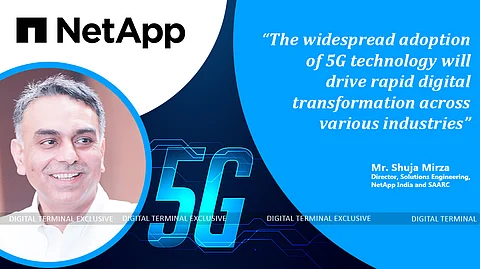

The adoption of 5G is expected to bring new capabilities for businesses, enabling them to solve the traditional business challenges effortlessly. The expansion of 5G will allow Indian businesses to reap the benefits of enhanced mobility, flexibility, reliability, and security. It will take the business transformation to never-before-seen levels.
Business Transformation with 5G
Commenting on how 5G will transform businesses, Shuja Mirza, Director, Solutions Engineering, NetApp India and SAARC said, “5G, is expected to bring about a significant transformation in Indian businesses, enabling them to enjoy the power of ultra-fast speeds, low latency, and high reliability. With 5G, Indian businesses will be able to develop and deploy new applications and services that require high bandwidth and real-time data processing which can lead to better customer experiences, increased efficiency, and reduced costs.
“The advances it will bring – everything from self-driving cars and smart cities, to connected healthcare and industrial IoT, will truly revolutionise every sector and open new avenues for businesses across regions. Adoption of 5G can further facilitate the development of smart cities in India, where IoT devices can be used to monitor and manage public services such as transportation, waste management, and energy consumption. This can create new opportunities for businesses in areas such as smart transportation, energy management, and environmental monitoring. The deployment of such advanced technologies can also contribute towards a sustainable future by optimizing resource utilization and minimizing the carbon footprint,” added by Shuja.
Opportunities for Technology Players
Putting across the views on opportunities, Shuja said, “One of the most significant benefits of 5G adoption is that it can facilitate increased deployment of emerging technologies such as artificial intelligence (AI), machine learning (ML), and the Internet of Things (IoT). With its high bandwidth and low latency, 5G can enable businesses to develop new applications and services that leverage real-time data processing and analytics, creating new opportunities for growth and profitability. Additionally, it can enable smooth hybrid work and collaboration, allowing employees to work from anywhere, using a variety of devices. This can help businesses to attract and retain talent, reduce costs, and improve productivity.”
Shuja further added, “The widespread adoption of 5G technology will also drive rapid digital transformation across various industries, opening up new avenues for technology players to provide digital solutions and services. Overall, its adoption presents a promising future for technology players to innovate, grow, and contribute to the country's digital transformation.”
Rise in Data Consumption & Generation
Data consumption in India has been growing rapidly in recent years due to the increasing adoption of digital technologies coupled with India’s rapid economic growth. IoT is expected to generate 90 zettabytes of data by 2025 according to FICCI, and supported by 5G, will enable real-time data generation.
“By enabling faster data transfer speeds, increased bandwidth, and reduced latency, the implementation of 5G technology can significantly improve data management strategies. With 5G, organizations can collect, process, and analyse vast amounts of data in real-time, leading to better business outcomes and decision-making. Furthermore, 5G's capability to support more connected devices and sensors can aid in the collection of more data points, enabling organizations to gain greater insights and enhance their data-driven strategies,” Shuja said.
Challenges in The Adoption of 5G
When asked about challenges, Shuja said, “Though the adoption of 5G is a boon to Indian business, there are a few challenges for organisations while adopting 5G, which are as follows:
· Upgrading existing infrastructure to support 5G technology requires significant investment, which can be a deterrent to some enterprises, especially at a time when companies are looking to optimise their IT spends.
· Deployment of 5G networks require a higher number of small cell sites, which can be a complex and time-consuming process.
· With increased speeds, can come increased cyberattacks. Organizations should be prepared for security concerns related to the increase in connected devices and data transmission. This entails ensuring that their networks are secure and implementing appropriate measures to protect sensitive data from cyber-attacks.